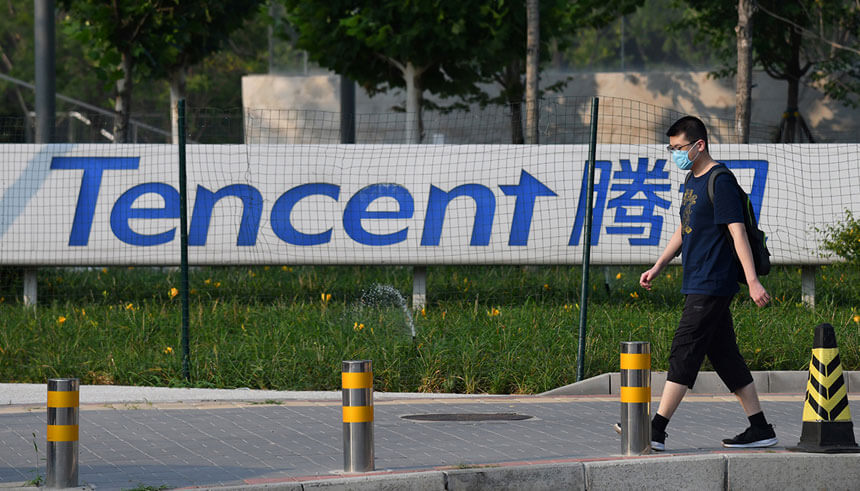U.S.-Asia Business
US-China Market Watch: Bipartisan Bills Target China, Tencent and Didi Fined, China Box Office
By

Your monthly roundup of the latest US-China business and industry news.
Bipartisan bills aim to crack down on China
Two bipartisan bills—the Strategic Competition Act of 2021 and the Endless Frontier Act, which aim to advance U.S. competitiveness against China—have been introduced to Congress and have support from the Biden administration.
The Senate Foreign Relations Committee voted to advance the Strategic Competition Act to the full Senate for a vote. The act aims to more directly combat China’s rising dominance by developing a program to help U.S. companies move their supply chains out of China, expanding review of certain foreign direct investments, and working more closely with U.S. allies on export control policies. It would also press the Chinese government on human rights abuses and boycott the 2022 Beijing Olympics by U.S. officials.
The Endless Frontier Act is more focused on improving domestic U.S. technology industries. The bill, led by Senate Majority Leader Chuck Schumer of New York, would allocate $100 billion over five years for “basic and advanced technology research,” as well as $10 billion to create at least 10 technology hubs around the nation. However, the bill is currently delayed because Senate Republicans said the markup will not go forward until after the Senate recess that ends on May 10.
Tencent and Didi hit with fines, regulators launch Meituan probe
Just weeks after Alibaba was hit with a record $2.8 billion fine, Chinese antitrust regulators have hit 10 major internet companies, including Tencent and rideshare company Didi Chuxing, with fines of 500,000 RMB each for breaching China’s antimonopoly laws. The companies were fined for not reporting acquisitions of smaller competitors and the formation of joint ventures, and is part of regulators’ larger efforts to rein in misconduct from its tech giants. Some of the behaviors regulators are specifically targeting include forcing merchants to choose one platform over another, misusing data to price gouge, and evading tax payments, among others.
Regulators have also opened a probe to investigate possible monopolistic practices by online shopping platform Meituan for forcing exclusivity.
Earlier in April, dozens of China’s tech giants, including Meituan, publicly pledged to comply with China’s antimonopoly laws and listed areas in which they could “work to build a fair and competitive market.” Bloomberg posits that this crackdown on internet companies, which aggregate data from all their users, could be a part of a wider strategy by Chinese President Xi Jinping to create a market for that data and help build out China’s digital infrastructure.
China box office tops 2020 cumulative gross
In 2021, China’s box office has raked in over $3 billion through April. Total gross has already far exceeded the United States’ 2020 cumulative of $2.1 billion and has outstripped China’s entire 2020 box office gross of $3.06 billion. However, the numbers remain far from the record-setting $9.1 billion made by the U.S. box office in 2019.
The resurgence of China’s box office has been driven largely by domestic Chinese titles such as “Hi, Mom” and “Detective Chinatown 3,” which comprise the top two highest grossing films of 2021 so far. The only non-Chinese film to make the top five is Legendary Pictures’ “Godzilla vs. Kong,” which has earned over $400 million at the global box office and marks the biggest Hollywood premiere during the pandemic.
Tesla to start recycling EV components at Shanghai gigafactory
Tesla Inc. submitted a document to Chinese authorities indicating that it plans to add electric vehicle components recycling capabilities to its Shanghai gigafactory, as part of its broader strategy of localizing EV production on the mainland. In the document, Tesla says it plans to repair and reproduce key EV components such as battery cells and electric motors, as well as add manufacturing capabilities for things such as car structures and electric motor controllers. Chinese regulators have also added rules on recycling certain EV components to be more environmentally friendly.
Despite facing a chip shortage, Tesla had a record $10.39 billion in revenue in the first quarter of 2021—a 74% year-over-year increase that was driven in part by strong sales of its Shanghai-made Model Y cars. However, Tesla has also faced some negative publicity in the U.S. and China over crashes involving its vehicles.
Chinese edtech company considers $500 million U.S. IPO
Online education company Zuoyebang is reportedly planning a U.S. IPO as early as the second half of 2021 and aims to raise at least $500 million. Previously, Zuoyebang raised $1.6 billion in Series E+ funding. In China, 70% of K-12 students use the edtech company’s tutoring service, with 65 million people having viewed their livestreamed classes and 10 million paying users signed up at the start of the last academic year.

